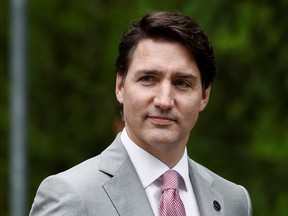The Trudeau administration has survived scandals and failures, but nothing has taken support like high inflation

After a decisive victory in the first Gulf War in March 1991. Bush's ability to perform duties, 90% approved by then-President George H.W.
Eighteen months later, the United States fell into recession and 64% did not approve his administration.
In November 1992, Bill Clinton was elected the 42nd President of the United States against the backdrop of his informal slogan, "It's Economy, Stupid."
Benjamin Franklin, one of the founding fathers of the United States, said:
The same immutable law governs Canadian politics.
The Trudeau administration has survived scandals and failures, but nothing has lost as much support as high inflation.
The Liberal Party lags behind most polls against the Conservatives, who have not yet elected a permanent leader.
For liberals, the situation can get worse before it gets better.
-

David Rosenberg: The stock market is in recession
-

John Ivison: Freeland's magical spending eliminates inflation Hmm
Canadians do not yet have a complete picture of the macroeconomic misery as another recession is imminent — The unemployment rate is high and conservatives are frowning, sneaking their hands.
The Bank of Canada released a survey on consumer expectations on Monday, suggesting that more people are concerned about inflation than in the first quarter of this year.
More Canadians believe inflation will remain high over the long term, but expected wage increases rarely catch up with prices.
Studies show that confidence in Bank of Canada is declining to bring inflation back to its target of 2%.
While there are concerns about real wage growth and access to credit, confidence in labor market conditions and the general economic environment is above historical averages, and people have significant savings. Accumulated during the next 12 months of pandemic. Raising interest rates once or twice could put these plans on hold, but the big picture seems to be more disjointed than the facts guarantee.
The debate among economists is whether Canada will fall into recession. To some extent, the recession is psychological. If people feel relieved to work, they will continue to spend. However, warning signs from around the world show that it is difficult for Canada to get out of recession. Russia's invasion of Ukraine and China's blockade of COVID are exacerbated by signs of a slowdown in the United States. The United States has experienced a surge in real mortgage rates since 2010, and its housing market has become a crater.
In aarticle in the financial post last week, David Rosenberg and Brendan Livingstone mentioned a 24% drop from the peak to the trough of the S&P 500. A little over five months is a reliable indicator of a recession. A 20% decline in the index over five months predicts an absolute decline in economic activity for 100% of the time (5 out of 5) since 1970.
At a meeting in Calgary last week, former central bank governor Mark Carney said the risks of a recession in the United States and the world, even if Canada is likely to succeed. Said, "Unpleasantly expensive." Than most other countries.
When I took that into account in more detail, the canary in a recessionary mine was the Manufacturing Management Index, a precursor to future production. It fell to 54.6 in June, slightly above the 50 growth readings.
Recession is inevitable. Bank of Canada's Business Outlook Survey (also released Monday) shows that labor-related constraints contribute to inflation. A slowdown in the economy could free workers who could be absorbed elsewhere and ease upward pressure on prices.
But whether in recession or not, there are likely to be periods of high inflation, slowing growth, and rising unemployment — the fatigue of stagflation that kills the government.
In a speech last month, Treasury Minister Chrystia Freeland boasted that "work is plentiful and business is booming."
However, the tide is disappearing and liberals may eventually become endeavors and be exposed.
• Email:jivison@postmedia.com | Twitter:

Sign up to receive daily top stories from National Post, a division of Postmedia Network Inc. By clicking the
Thank you for registering.
A welcome email has been sent. If you don't see it, check your junk folder.
The next issue of NPPosted will arrive in your inbox shortly.


